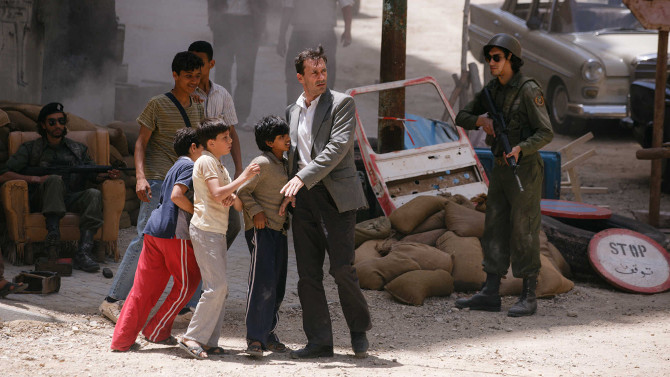Ah, vacation time. Nothing like getting that call out of the blue – excited to be invited on a golf trip, to be asked to go down south (avoiding the winter blues), or to fly over to Europe. . . alas, this is not the case in today’s feature. Our protagonist, negotiator/arbitrator Mason Skiles (Jon Hamm), is strong-armed into taking a flight over to Beirut (a place he has vowed never to return to again – and also the title of the film) to give a so-called “academic lecture” – as we all know, this supposed job is simply cover for something decidedly more shady.
Scribed by Bourne franchise writer Tony Gilroy (his previous effort to this, Rogue One: A Star Wars Story) and directed by Brad Anderson (Transsiberian), the pair actually open the film in Beirut (1972) ten years prior to when our story takes place, a glimpse into the man’s past in the city. Flash forward a decade and Skiles is a shell of the man he once was – a disjointed alcoholic living a fugue state instead of a life.
Grudgingly hopping onto a plane and returning to Lebanon, it is a change of scenery not needed or wanted. Greeted by a friendly University handler, he smiles after shots are fired a mere twenty feet away – “Welcome to Beirut!”, he exclaims, perhaps slightly too cheerfully for the surroundings. With the city bombed, shelled and in turmoil, places that were once safe under his last occupancy have become ‘no go zones’, a city divided by religions, factions, and pretty much anything else you could think of (the Americans and Israelis also want to have their say).
Soon, the negotiator is brought into a room full of people with varied titles: Military, State Department, Ambassador, CIA officer – you get the point. Together, Donald Gaines (Dean Norris), Gary Ruzak (Shea Whigham), Frank Whalen (Larry Pine) and Sandy Crowder (Rosamund Pike) explain that he has been asked to lead negotiations (by the terrorists, specifically) to broker a deal in which they will try to recover high valued CIA operative Cal Riley (Mark Pellegrino) – a man who just happens to be his former best friend from back in the day.
Unsure of who to trust, Skiles is thrown into the wide unknown. Is it even possible to get the job done? Is he being used as a scapegoat? Returning to a world in which he has been out of for so many years, these are the people who will cut your throat in an instant. Money, power, and game playing get them off, a world of subterfuge, lies and shocking spurts of violence.
A fictional tale surrounded by gritty real life occurrences, Gilroy’s script is set in a dangerous time. In the heart of the Lebanese Civil War, you will hear reference made of the German Olympic Massacre of 1972, the Palestine Liberation Organization (PLO), the 1982 Lebanon War and so much more. It utilizes its history effectively, weaving its twisty story amongst actual occurrences to provide a more realistic perspective. That has not helped it avoid controversy (it starting with the release of its trailer) – countless people have slammed the film for not accurately portraying the Civil War, nor depicting Beirut or its people properly – while others have targeted the filmmakers choosing to have the lead be a white American when the story is set in Lebanon. . . though, despite the brouhaha, it is a quality constructed motion picture.
Smartly plotted and adult oriented, it is the type of traditional, non glitzy, espionage film that rarely gets made anymore. The last four that I can think of are: the George Clooney-starring Syriana (back in 2005), 2007’s The Kingdom (which is definitely more action leaning) as well as Zero Dark Thirty and Argo (both circa 2012). . . and, if you include British films, 2015’s Eye in the Sky.
Thriving in its fish out of water story, Skiles slowly sobers as he immerses himself within the case, putting his life on the line as he is pulled this way and that, never truly sure of what is round the next bend – but thriving once again playing the game of games. Of course, the narrative weaves in storylines from the 1972 opening scene flashback, a nice touch that adds another dimension to the script. Intriguingly, very few actually look good in this film, many of the Americans, Israeli and PLO less than stellar in their actions and behaviour, further adding to the man dropped into chaos theme.
Though perhaps a touch slow for some modern day viewers, Beirut builds its paranoia, espionage style, all centred on a strong performance from Jon Hamm. Featuring great turns from the rest of the cast, it plays somewhat like a John le Carré novel, tinkering, tailoring, soldiering, and spying its way through a complex tale. A few nice touches to further accentuate the era finds cinematographer Bjorn Charpentier utilizing vintage glass lenses from the time – not as sharp as today’s lenses, they give the picture a softer contrast and focus (the director of photography also chose to shoot with no light at night – depicting the blackness of the oft without power city); while they filmed in Tangier, Morocco – as it is much closer looking to 1982 Beirut than the present day city. . . these decisions help provide a very authentic feel. There should be no need to negotiate this one onto your list, it is well worth it on its own merit.


